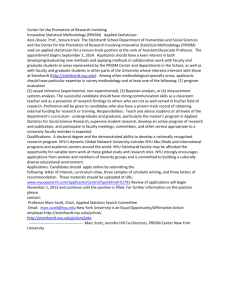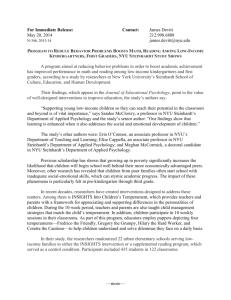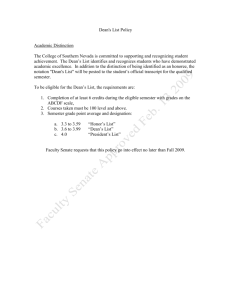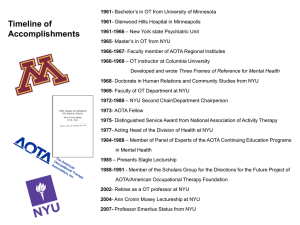Thomas Bender - NYU Steinhardt
advertisement
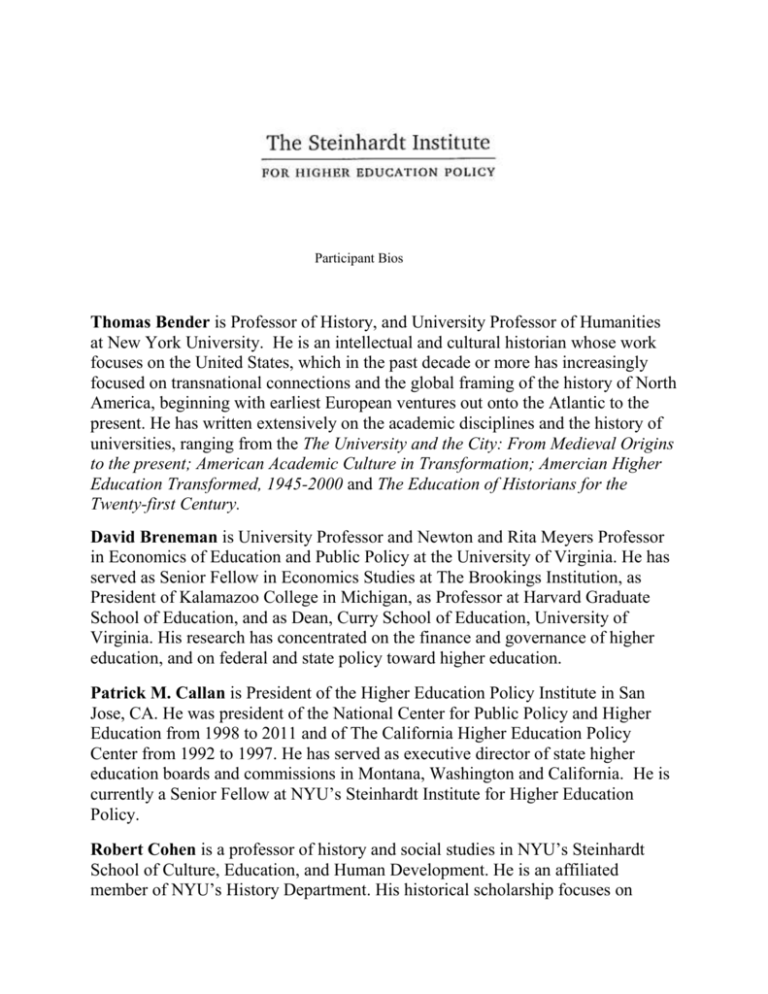
Participant Bios Thomas Bender is Professor of History, and University Professor of Humanities at New York University. He is an intellectual and cultural historian whose work focuses on the United States, which in the past decade or more has increasingly focused on transnational connections and the global framing of the history of North America, beginning with earliest European ventures out onto the Atlantic to the present. He has written extensively on the academic disciplines and the history of universities, ranging from the The University and the City: From Medieval Origins to the present; American Academic Culture in Transformation; Amercian Higher Education Transformed, 1945-2000 and The Education of Historians for the Twenty-first Century. David Breneman is University Professor and Newton and Rita Meyers Professor in Economics of Education and Public Policy at the University of Virginia. He has served as Senior Fellow in Economics Studies at The Brookings Institution, as President of Kalamazoo College in Michigan, as Professor at Harvard Graduate School of Education, and as Dean, Curry School of Education, University of Virginia. His research has concentrated on the finance and governance of higher education, and on federal and state policy toward higher education. Patrick M. Callan is President of the Higher Education Policy Institute in San Jose, CA. He was president of the National Center for Public Policy and Higher Education from 1998 to 2011 and of The California Higher Education Policy Center from 1992 to 1997. He has served as executive director of state higher education boards and commissions in Montana, Washington and California. He is currently a Senior Fellow at NYU’s Steinhardt Institute for Higher Education Policy. Robert Cohen is a professor of history and social studies in NYU’s Steinhardt School of Culture, Education, and Human Development. He is an affiliated member of NYU’s History Department. His historical scholarship focuses on politics, higher education, and social protest in twentieth century America. His social studies work links middle and high school teachers with the recent advances in historical scholarship and develops curriculum aimed at teaching their students to explore history as a critical discipline. Joni Finney is Director of the Institute for Research in Higher Education (IRHE) at the University of Pennsylvania. She is currently directing a five-state study, sponsored by the National Center for Public Policy and Higher Education, to understand the relationship between a state’s policies for higher education and a state’s performance. She served as vice president of the National Center for Public Policy and Higher Education for the past ten years. Prior to that, Dr. Finney was with the California Higher Education Policy Center and the Education Commission of the States. Richard Freeland is Commissioner of Higher Education for Massachusetts, appointed to this position in January 2009. Working with the Board of Higher Education, he is responsible for providing overall direction to public higher education in Massachusetts and helping shape state-level policies that maximize the benefits of higher education to the Commonwealth and its citizens. Previously, Freeland was President of Northeastern University for ten years, from 1996 to 2006. Freeland has spent his entire academic career in urban higher education. He is the author of Academia’s Golden Age: Universities in Massachusetts, 19451970. James Furman is former Executive Vice President and emeritus member of the Board of Directors of the John D. and Catherine T. MacArthur Foundation. He is also a former Executive Director of Washington's first coordinating board, the Council on Higher Education, former Executive Director of the Illinois Board of Higher Education, and former Executive Vice-President of the Ohio Board of Regents. Roger Geiger is Distinguished Professor of Higher Education at The Pennsylvania State University and former Head of the Higher Education Program (1997-2000; 2003-2007). His research has focused on the history of American higher education and its research universities. He is also an editor of The Future of the American Public Research University (2007) and author of Knowledge and Money: Research Universities and the Paradox of the Marketplace (2004). He has edited Perspectives on the History of Higher Education since 1993, and is Senior Associate Editor of The American Journal of Education. Ted Hollander served as Chancellor of the New Jersey Department of Higher Education. He assumed the position in August 1977. Early in his career he joined the faculty of the City University of New York as a university professor and associate professor of accounting, and served as CUNY Vice Chancellor in the late 1960’s. He left CUNY to accept an appointment at the New York State Education Department as deputy commissioner for higher and professional education until coming to New Jersey as head of the Department of Higher Education. Arthur Levine is the sixth President of the Woodrow Wilson National Fellowship Foundation. Before his appointment at Woodrow Wilson, he was president and professor of education at Teachers College, Columbia University. He also previously served as chair of the higher education program, chair of the Institute for Educational Management, and senior lecturer at the Harvard Graduate School of Education. He has written widely on such subjects as the preparation of school leaders, teachers, and education researchers; education inequity; school reform; higher education innovation; and trends among college students. Ann Marcus is professor of higher education and director of NYU’s Steinhardt Institute for Higher Education Policy after serving as Dean of the Steinhardt School of Education for 14 years. Her career has included a variety of senior leadership positions in both the public and private sectors of higher education. At the City University of New York, she served as Director of Planning for Community Colleges (1969-71) and joined LaGuardia Community College as its first Dean of Continuing Education in 1972. She joined NYU in 1976 as Dean of the School of Continuing Education, and in the 1980's served as Vice President for Student Affairs for ten years. Aims McGuiness is a senior associate with the National Center for Higher Education Management Systems (NCHEMS), a private nonprofit policy center in Boulder, Colorado. At NCHEMS, he specializes in state governance and coordination of higher education; strategic planning and restructuring higher education systems; roles and responsibilities of public institutional and multicampus system governing boards; and international comparison of education reform. Prior to joining NCHEMS in 1993, he was director of higher education policy at the Education Commission of the States (ECS). Before joining ECS in 1975, he served as a congressional staff member and was executive assistant to the Chancellor of the University of Maine System. Richard Richardson is professor emeritus of higher education at NYU. His recent studies have examined policy and higher education performance, structural designs, and systemic change for state higher education systems. He recently completed a Ford Foundation funded research project that was designed to improve understanding of the linkages between federal and state policies and college and university performance in the US, Mexico and Canada. His most recent book with co-author Mario Martinez is Policy and Performance in American Higher Education: An Examination of Cases Across State Systems (2009). Sheldon Rothblatt is Professor Emeritus of History and Former Director of the Center for Studies in Higher Education at the University of California, Berkeley. He is a Fellow of the Royal Historical Society of Britain, a Foreign Member of the Royal Swedish Academy of Sciences and a Member of the National Academy of Education. He was knighted by the King of Sweden in 2010 as Knight Commander of the Royal Order of the Polar Star (1748). He is an historian of ideas and culture writing on the comparative history of universities in the modern period. Ethan Schrum studies the intellectual, cultural, and political history of the United States and its role in the world from the late nineteenth through the twentieth century, with a primary research focus on the role of universities and academic knowledge in American life. He earned his Ph.D. in history at the University of Pennsylvania in 2009 and subsequently served as a lecturer in history. He has published several articles, including “Clark Kerr’s Early Career, Social Science, and the American University” (Perspectives on the History of Higher Education, 2011). Catharine Stimpson is University Professor and Dean Emerita of the Graduate School of Arts and Science at New York University. From 1994 to 1997 she served as Director of the Fellows Program at the MacArthur Foundation in Chicago. She has also served as University Professor and dean of the Graduate School and Vice Provost for Graduate Education at Rutgers from 1986 to 1992. Before going to Rutgers, she taught at Barnard College, where she was also the first director of its Women's Center. Zehev Tadmor is distinguished Research Professor at the Chemical Engineering Department of The Technion – Israel Institute of Technology, and serves as Chairman of the S. Neaman Institute for Advanced Studies in Science and Technology. . He served as Dean of the Chemical Engineering Faculty, Director of the S.Neaman Institute, and President of The Technion from 1990 to 1998. At the Neaman Institute, Professor Tadmor leads its Higher Education Forum. Harold Wechsler co-directs NYU's Ph.D. program in Education and Jewish Studies. He has published widely on higher education access, governance, and the formation of curriculum and disciplines in American higher education. Wechsler formerly chaired the higher education programs at the University of Chicago and Northwestern University. Sponsored by a major Spencer Foundation grant, Wechsler currently studies the history of minority access to American higher education. He edits the NEA annual Almanac of Higher Education and coedits the ASHE Reader on the History of Higher Education.
